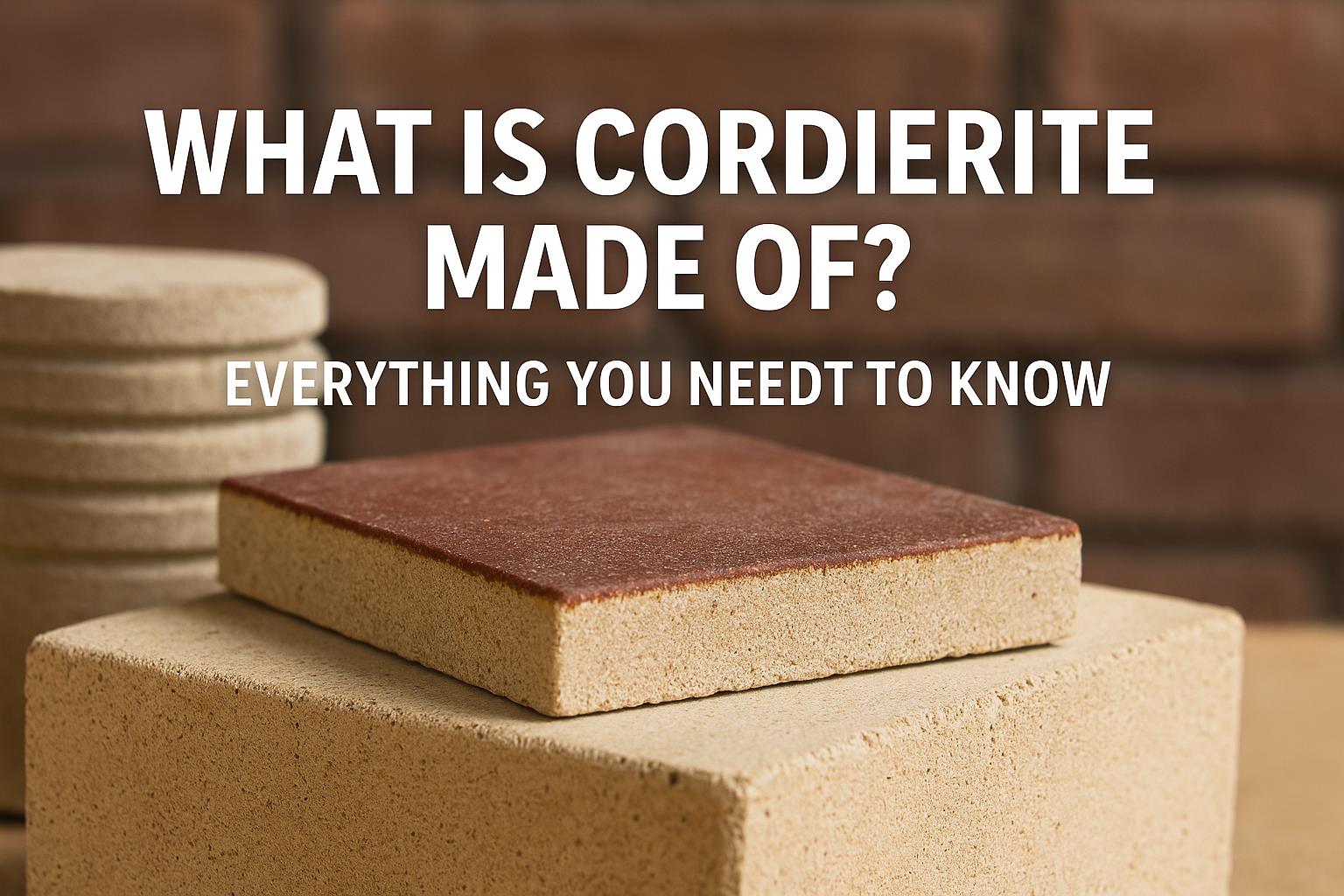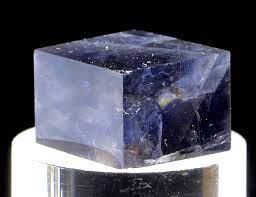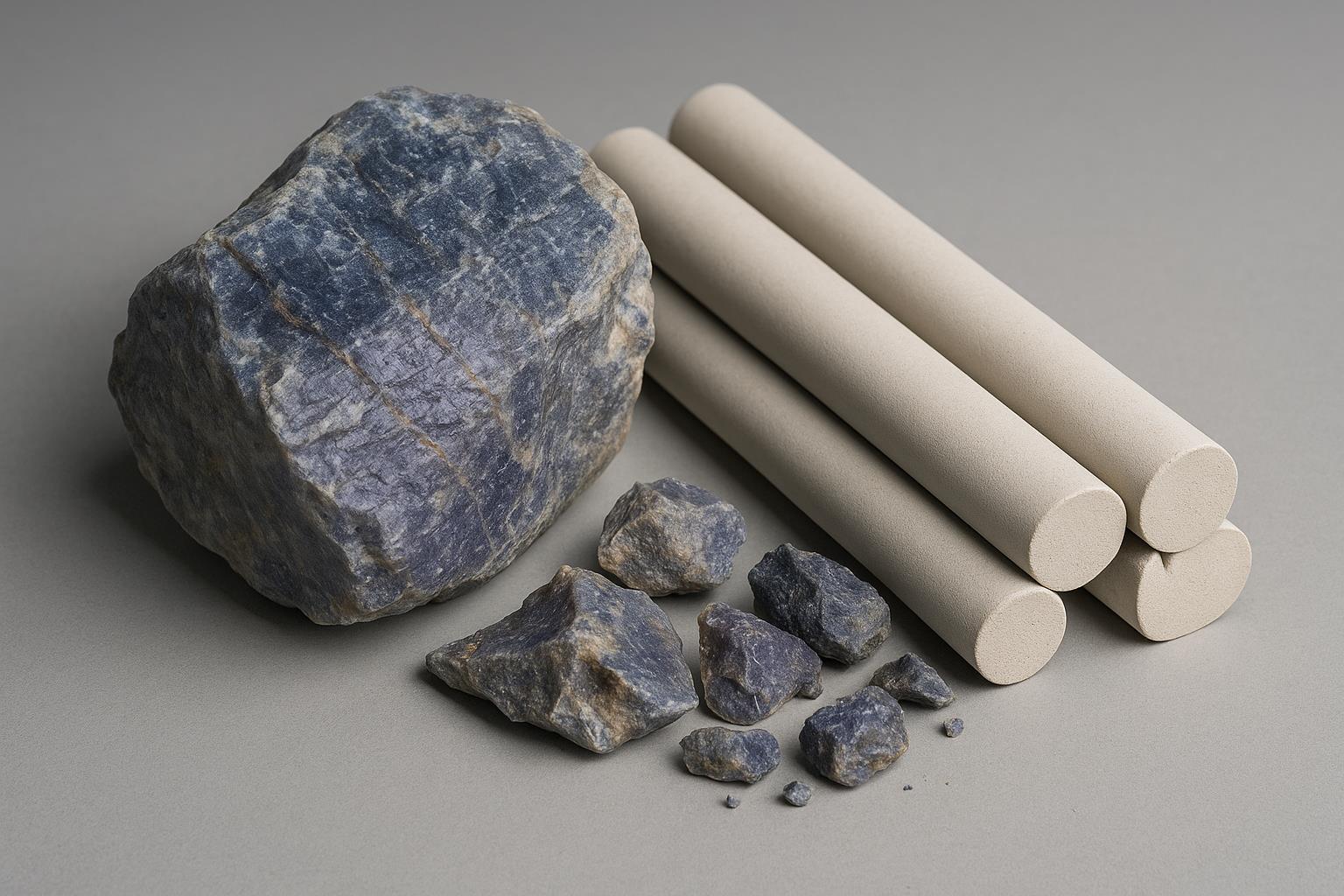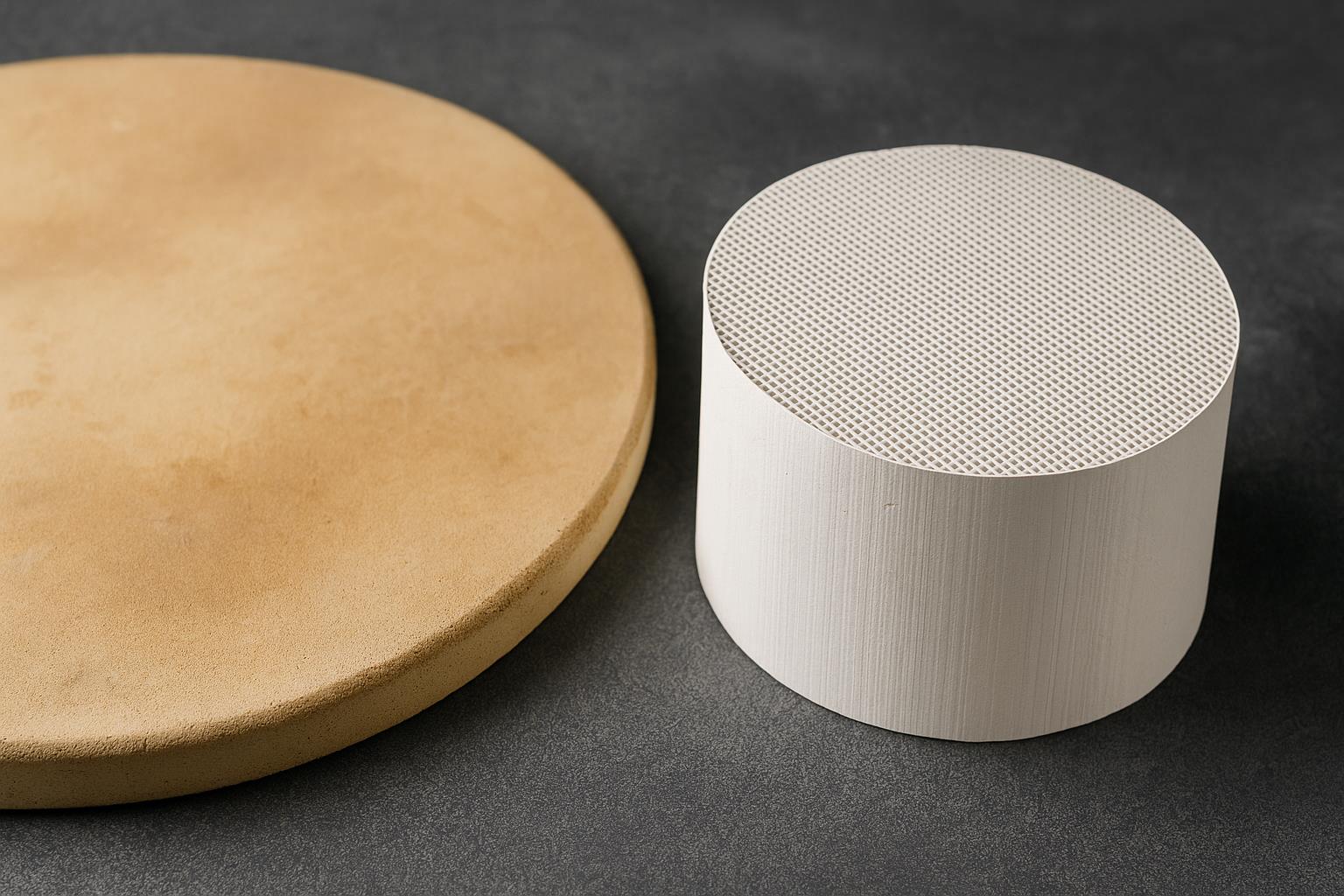What Is Cordierite Made Of? Everything You Need To Know
Time of issue: 2025-07-01 15:50:32
Cordierite is a ceramic known for its heat-resistance. They are made from magnesium, aluminium and silicon. It looks like just another ceramic, but it performs far better in high-stress environments. It doesn’t crack, warp, or break down, even in extreme temperatures.
You’ll often find it in pizza stones, kiln furniture, catalytic converters, and other tools or parts that deal with intense heat. Cordierite stands out for its ability to handle thermal shock. That means it can go from cold to hot without falling apart. That’s a big reason it’s used in both industrial tools and everyday products.
In this guide, we’ll walk you through everything you need to know. What cordierite is, where it’s used, why it matters, and how it compares to other materials. Whether you're working in a factory or baking at home, this material plays a bigger role than you might think.
And if you’re looking for reliable, high-quality cordierite products, you’re in the right place. This guide is brought to you by Global Reach Ceramic, where performance meets precision.
What is Cordierite?
Cordierite is a type of ceramic made from natural minerals like magnesium, aluminum, and silicon. What makes it stand out is how well it handles heat. It doesn’t crack, bend, or change shape easily, even under very high temperatures. That’s because it expands very little when heated.
It also has a special crystal structure that adds to its strength. In nature, cordierite can form a blue gemstone called iolite. But most of the time, when people talk about cordierite, they mean the tough ceramic version. It’s strong, stable, and built to last under stress.
Why Cordierite Matters in Modern Industry

Cordierite is important because it solves one of the industry’s biggest problems: dealing with heat. Many machines and tools operate under extreme temperatures. Most materials either crack, melt, or lose strength. Cordierite doesn’t. It stays solid, stable, and reliable even when the heat gets intense.
This makes it perfect for industries like automotive, ceramics, metal processing, and power generation. For example, in car engines, it’s used in catalytic converters to handle hot exhaust gases. In ceramic factories, it supports heavy loads inside kilns without bending or breaking. It keeps its shape and doesn’t expand much, even during fast temperature changes.
It’s also lightweight, which helps reduce energy use and stress on machines. And since it doesn’t react with most chemicals, it works well in harsh environments too. With all these strengths, cordierite helps factories run more safely, efficiently, and cost-effectively. That’s why it’s become a trusted material across modern industry.
Scientific and Technical Properties of Cordierite
Cordierite isn’t your average ceramic. It’s known for handling heat, pressure, and sudden temperature changes without breaking a sweat.
Core Features of Cordierite:
- Chemical Composition: Made of magnesium, aluminum, and silicon (Mg₂Al₄Si₅O₁₈).
- High Melting Point: Withstands temperatures up to approximately 1470°C (2678°F).
- Hardness: Ranks between 7 and 7.5 on the Mohs scale, offering solid durability.
- Low Thermal Expansion: Expands very little when heated (~2.5 × 10⁻⁶/°C), reducing the risk of cracking.
- Thermal Shock Resistance: Maintains stability during quick temperature changes.
- Lightweight Structure: Density of 2.6 g/cm³, making it strong yet easy to work with.
Because of its low thermal expansion, cordierite holds its shape under extreme heat. It doesn’t crack when the temperature changes quickly, which is exactly why it’s trusted in high-stress environments like kilns, ovens, and engines. It’s strong, stable, and built to last.
Where Cordierite Is Used Today

Cordierite is one of those materials that work behind the scenes. You don’t always see it, but it plays a big role in things you use every day.
In Your Car’s Exhaust System
If you drive a gas car, there’s a good chance cordierite is inside the catalytic converter. That’s the part that helps reduce pollution. Cordierite holds up to the extreme heat from your engine without cracking or changing shape. It keeps things running safely and cleanly.
In Kilns and Pottery Studios
Cordierite is a favorite in the ceramics world. It’s used to make kiln furniture. Those strong shelves and posts that support pottery while it’s being fired. Because it stays flat and solid under heat, it keeps pieces from warping or breaking.
In Your Kitchen
Ever used a pizza stone that gives you a perfect, crispy crust? That might be cordierite. It handles the heat of your oven without breaking, and it spreads warmth evenly so your food cooks just right.
In Industrial Settings
Big machines that deal with heat. like furnaces and foundries use cordierite too. It acts as a heat shield or structural support that won’t melt or fall apart, even after repeated use.
Even in Electrical Equipment
Cordierite doesn’t carry electricity, which makes it useful for some electronic insulators and heat-safe components.
Cordierite vs Other Ceramic Materials
Cordierite is great with heat, but it’s not the only ceramic out there. So, how does it stack up against others like mullite, alumina, and silicon carbide? Let’s break it down in simple terms.
| Material | Handles Heat | Crack Resistance | Weight | Price |
| Cordierite | Very good | Excellent | Light | Affordable |
| Mullite | Excellent | Good | Medium | More expensive |
| Alumina | Extremely high | Average | Heavy | Expensive |
| Silicon Carbide | Best of all | Excellent | Light | Very expensive |
So, What Makes Cordierite Special?
Cordierite doesn’t just handle heat. It handles sudden changes in temperature really well. That means it won’t crack if it heats up or cools down fast. It’s also lighter and usually costs less than other high-performance ceramics.
Sure, materials like alumina and silicon carbide can take higher temperatures, but they’re heavier and much pricier. For most everyday and industrial uses, cordierite gives you the best balance of performance, price, and durability.
If you need a ceramic that’s tough, reliable, and won’t break the bank, cordierite is a solid choice.
What Scientists Are Saying About Cordierite

Scientists like cordierite for one big reason. It stays strong under heat. That’s a major benefit for industries that deal with high temperatures.
Studies show that cordierite has very low thermal expansion. This means it doesn't swell, shrink, or crack when the temperature quickly changes. That’s why it’s often used in kilns, ovens, and engines.
Researchers also found something unique. Cordierite doesn’t expand the same in every direction. This is called anisotropic expansion. It helps the material stay balanced and stable, even in extreme heat.
Experts also point to its crystal structure. It’s tough but still lightweight, which is rare for ceramics.
In short: scientists trust cordierite because it’s strong, heat-resistant, and long-lasting. That’s why it’s used in industries where failure isn’t an option.
Cost Breakdown of Cordierite
Cordierite is known for being tough, reliable, and fairly priced. The cost of cordierite depends on size, grade, and where you buy it. Larger or thicker pieces cost more. Industrial-grade is pricier than home-use types. U.S. suppliers may charge slightly more but offer faster delivery. Buying in bulk usually brings the price down.
Overall, cordierite gives you strong performance at a reasonable price whether you're firing ceramics, baking pizza, or powering industrial equipment. While it’s more affordable than many advanced ceramics, the actual cost depends on what you need it for.
Here’s a general idea of what you might pay:
| Product Type | Average Price Range (USD) |
| Pizza Stone (Home Use) | $25 – $60 per piece |
| Kiln Shelves & Furniture | $50 – $200 depending on size |
| Cordierite Blocks or Plates | $10 – $50 per unit |
| Catalytic Converter Substrate | Bulk pricing – contact supplier |
Frequently Asked Questions
Question: Is cordierite a natural stone?
Yes, cordierite is a naturally occurring mineral made of magnesium, aluminum, and silicon. In its natural form, it appears as a gemstone called iolite. However, the cordierite used in ceramics and industrial products is often manufactured for better strength and heat resistance.
Question: Is cordierite safe for food?
Yes, cordierite is 100% food-safe and non-toxic. It doesn’t release harmful chemicals, even under high heat. That’s why it’s widely used in pizza stones, baking slabs, and grill plates for home and commercial cooking.
Question: Is cordierite the same as ceramic?
Cordierite is a type of ceramic, but it performs better in heat-heavy environments. Unlike regular ceramics, it has low thermal expansion and high thermal shock resistance, making it ideal for kilns, ovens, and industrial use.
Question: What is cordierite used for?
Cordierite is used in many high-temperature applications. It’s commonly found in catalytic converters, kiln furniture, pizza stones, and thermal insulation products. It’s chosen for its durability, heat resistance, and ability to stay stable under stress.
Bottom Line
Cordierite is strong, reliable, and built to handle heat. It doesn’t crack when temperatures rise or drop fast. That’s what makes it so useful in both homes and industries. You’ll find it in ovens, kilns, car parts, and more. It stays solid where other materials fail. And it does all this without being too heavy or too expensive. If you’re working with heat and need something that lasts, cordierite is a smart choice. It’s simple, safe, and performs when it matters.
Looking for high-quality cordierite products? Global Reach Ceramic has what you need. Strong materials, honest pricing, and trusted support.
RECENT POSTS
- Ceramic Cookware vs Cast Iron: What Should You Choose?
2026-01-19
- Ceramic Glazing Techniques & Benefits in 2026
2026-01-19
- The Benefits of Wholesale High-Quality Ceramic Products for Retailers
2025-12-17
- Can You Make an Ashtray with Air Dry Clay? Pros, Cons, and Safer Alternatives
2025-12-17
- The Impact of Ceramic Materials in Energy-Efficient Buildings: Benefits and Applications
2025-12-04
- Top 7 Ceramic Cookware Health Benefits: Why It’s a Safer Choice for Your Kitchen
2025-12-04
- How to Clean Ceramic Planters and Improve Their Lifespan?
2025-11-17
- 15 Best Ceramic Holiday Gift Ideas for 2025: Thoughtful, Elegant & Heartfelt
2025-11-17










